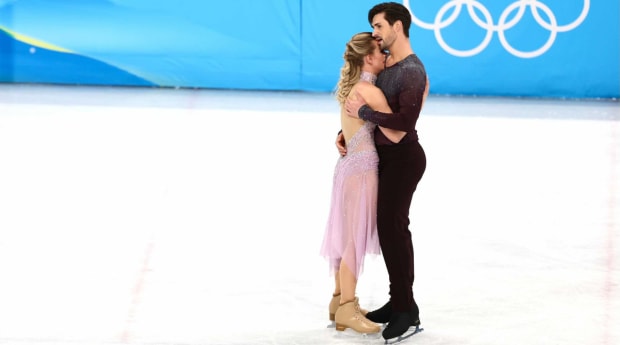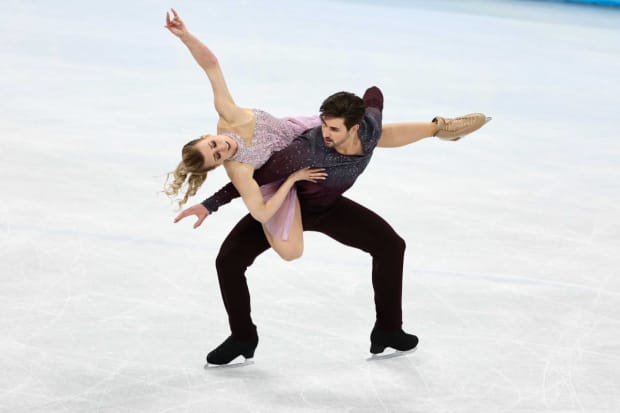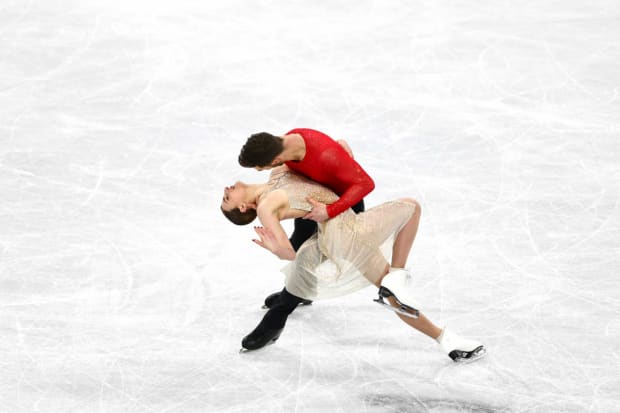After more than a decade together as a team—and a stretch as a couple off the ice—the skating pair finally captured an Olympic medal in their last competition.
BEIJING — For the first time all day, they were out of sync. Madison Hubbell and Zachary Donohue had just finished a routine that would earn them a career-best 130.89 and an Olympic bronze medal in ice dancing on Monday, and they had done it in almost perfect unison, from the twizzles to the choreography to the farewell wave at the end. But as they skated off the ice, Hubbell locked eyes with coach Marie-France Dubreuil, who spun a finger in the air. Take it in.
Hubbell, 30, twirled once, and then again, trying to memorize the sensations. Donohue, 31, followed her lead. Hubbell, who often finds herself weeping at music in the warmup area, burst into tears. Donohue chuckled.
“It’s been a while since I cried,” he said.

Simon Bruty/Sports Illustrated
Then they were back in lockstep. They walked together to the kiss-and-cry area to await their score, and they clasped hands when it came through, guaranteeing them at least bronze. They had decided—and announced—that this would be their last season. To cap it with their best performance offered a kind of closure they had barely imagined.
They didn’t need the medal to feel proud, they said afterward. “I mean, it looks good on the CV,” said Hubbell with a laugh. But, she explained, “a part of our decision of retiring after this year was because we were already very satisfied with what we had accomplished on the world stage. And so this is a cherry on top, certainly, a beautiful experience. I can't wait to celebrate it with all of our friends and family. But I don't know if it necessarily—it’s not like the defining moment.”
It was a good moment, though, and they wanted to remember it. Indeed, that’s part of why they announced their retirement ahead of time, against the advice of some of their friends who thought the fanfare might distract them.

Simon Bruty/Sports Illustrated
“We're making this choice because we think it will put us in the moment,” Hubbell said. “We think it will make us appreciate every day, because it’s heartbreaking to walk away. Skating and the things that we experienced together are irreplaceable. We're leaving at our happiest, at our most successful, at our peak in every way. So it is hard to walk away, but it was right, and even the best choices can be hard sometimes.”
That has been true for them for years. They became a pair in 2011 and a couple about six months later. After two and a half years, they decided to break up romantically—but keep skating together. Now they are both in relationships with other ice dancers, but they remain best friends. They finished fourth together in PyeongChang, and they have two silver medals and a bronze from world championships. The history added to Monday’s emotion.

Simon Bruty/Sports Illustrated
For most of the day, they did not let themselves feel it. They endured a sleepless night, then ate breakfast together at 5:30 a.m. They were all business from there. They had scored a career-best 87.13 points in the rhythm dance on Friday, leaving them in third place, but they knew many of their competitors were dangerous: Gabriella Papadakis and Guillaume Cizeron of France, who would take gold; Victoria Sinitsina and Nikita Katsalapov of the Russian Olympic Committee, who would take silver; and one of the other U.S. pairs, Madison Chock and Evan Bates, who would finish fourth.
“We knew that we had to be very focused and in the moment during the performance and rely that that would be sufficient,” said Hubbell. “And so at the end, we just were trying to soak in as much as we could of Olympic ice without any pressure, without anything riding on the line. We just wanted to take a moment to thank the audience, thank each other, the arena. Not many people get to experience that moment, so it would be a shame to walk away without really appreciating it.”
They will compete at one final world championships, in March, together. They will embark on a showcase tour together. But first, they will take a ride to the Beijing Medals Plaza, where they will ascend a podium and hang their hardware around their neck. Together.
More Olympics Coverage: